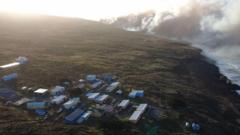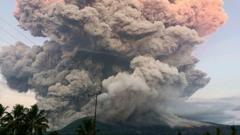A month-long wildfire crisis has devastated over half of Amsterdam Island in the Indian Ocean, prompting evacuations and raising alarms about the ecological impact and interruption of vital atmospheric research.
Amsterdam Island Wildfires: A Scientific and Environmental Crisis

Amsterdam Island Wildfires: A Scientific and Environmental Crisis
Significant portions of Amsterdam Island have been engulfed by wildfires, raising concerns for unique wildlife and scientific research efforts.
Amsterdam Island, a French territory located in the south Indian Ocean, is facing a dire wildfire crisis that has persisted for nearly a month. The island, which spans 54 square kilometers and lacks a permanent population, is primarily home to a research station that has been in operation since the 1980s. Recent reports indicate that wildfires have consumed more than 55% of the island’s area since the outbreak began.
On January 15, a scientist conducting atmospheric research discovered the fire near the Pointe Bénédicte observatory, an essential facility for monitoring greenhouse gases, mercury, and aerosols. Despite the scientists' dedication to combating the flames, the fire progressed towards the main research base at Martin-de-Viviès. Fortunately, an evacuation was executed using a fishing vessel, the Austral, which fortuitously happened to be in the region; an earlier departure the previous week would have complicated the evacuation process.
According to Rémi Chazot, a computer scientist at the station, the crew's timely evacuation highlights the precarious situation faced by researchers. The impacted individuals have since been relocated to Réunion Island, which is closer to Madagascar and serves as another French territory.
The fire's swift spread has been attributed to dry conditions and strong winds that can reach up to 40 km/h (24 mph). With no rivers on the island and a network of peat bogs potentially fueling the flames, the situation has become increasingly dire. Satellite imagery has revealed significant damage to the island's solar energy systems and communication lines, not to mention the potential impact on the area's rich biodiversity, which includes exclusive breeding sites for the Amsterdam Albatross, southern elephant seals, and sub-Antarctic fur seals.
With its unique climate and limited pollution, Amsterdam Island has long provided researchers with crucial data regarding atmospheric changes. However, the ongoing evacuation marks the first suspension of atmospheric research in 45 years, raising concerns about what this means for scientific knowledge related to climate change. Mark Delotte, mission director at the Laboratory for Climate and Environmental Sciences (LCES), expressed his disappointment, indicating that recovery efforts will require both time and resources.
French authorities have initiated a reconnaissance mission aboard a navy vessel to assess the situation further. This mission comprises firefighters and technical staff who will focus on securing infrastructure rather than fully extinguishing the fire. They aim to investigate the cause of the fire’s onset and its spread across the island, while also working to restore the energy and water supply systems critical for future research efforts.






















